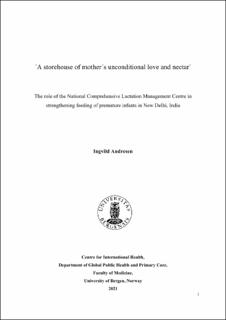´A storehouse of mother´s unconditional love and nectar´- The role of the National Comprehensive Lactation Management Centre in strengthening feeding of premature infants in New Delhi, India
Master thesis
Permanent lenke
https://hdl.handle.net/11250/2969086Utgivelsesdato
2021-12-15Metadata
Vis full innførselSamlinger
- Master theses [138]
Sammendrag
Introduction: Providing human milk to sick- and premature infants is a lifesaving intervention that alone can reduce neonatal mortality. Studies have shown that donor human milk is the second-best alternative after mother’s own milk (MOM). The establishment of human milk banks and lactation centres, give mothers a better chance to establish lactation. Along with this, donor human milk can be provided to the premature infants as ´gap-filler´ until the mother is able to produce adequate amount of MOM for their premature infant. The National Health Mission in India has established Lactation Management Centres at secondary and tertiary level public health facilities. These function as human milk banks and lactation counselling centres. Aim: The aim of this study was to explore the role of the National Comprehensive Lactation Management Centre (NCLMC) in strengthening feeding of premature infants in a tertiary care hospital in New Delhi, India. Methodology: During a three-month period, data were collected through seventeen in-depth interviews. Eleven of these was with lactation counsellors working in the NCLMC and six with mothers who delivered prematurely and received lactation counselling in the NCLMC. The interviews with the lactation counsellors were conducted over the online platform Zoom, while the interviews with the mothers were collected face-to-face in New Delhi by a research assistant. After translation and transcription, the data were analysed while using systematic text condensation (Malterud, 2012). Findings: The main findings illuminate mothers´ and lactation counsellors´ lived experiences related to infant feeding. It demonstrates how practical challenges complicates the process of establishing lactation, and how this combined with separation of mother and infant, caused feelings of failed motherhood. Practical, physical, emotional, and social support from the lactation counsellors was vital, but the findings also show that involving mother-in-law in counselling sessions was essential as their perceptions and presence influenced the mothers’ practices. Practicalities related to availability of electric breast pumps around the clock, challenged the mothers’ possibilities of providing MOM at all hours of the day. Restrictions due to Covid-19, caused delays in early initiation of lactation and created communication difficulties in counselling sessions. Motivational factors for donating MOM were related to reciprocal benefits and a religiously based motivation to do good as an act of solidarity towards mothers who did not have MOM. Discussion: The discussion draws upon concepts in medical anthropology, and existing research to make sense of the findings. The theory of health literacy illuminates how the mothers in the study understand their situation of providing MOM to their premature infant, and how the lactation counsellors approach them according to their level of health literacy. The theory of authoritative knowledge is used to understand how the lactation counsellors impart knowledge to mothers in the counselling sessions. Conclusion: There is great need for Lactation Management Centres in New Delhi, India to ensure access to MOM and to provide safe use of donor human milk (DHM) to infants admitted to the Neonatal Intensive Care Units. Lactation Support to a mother with a premature infant must go beyond establishing lactation. It should include practical, physical, emotional, and social support to ensure that the individual mother is capable to provide MOM to their infant. Future studies are needed to get a broader understanding of how of the Lactation Management Centres improve the access of human milk for infants, and how these centres can develop ways of reducing distance and increase possibilities for attachment between premature infant and mother during the first critical phase after birth.
